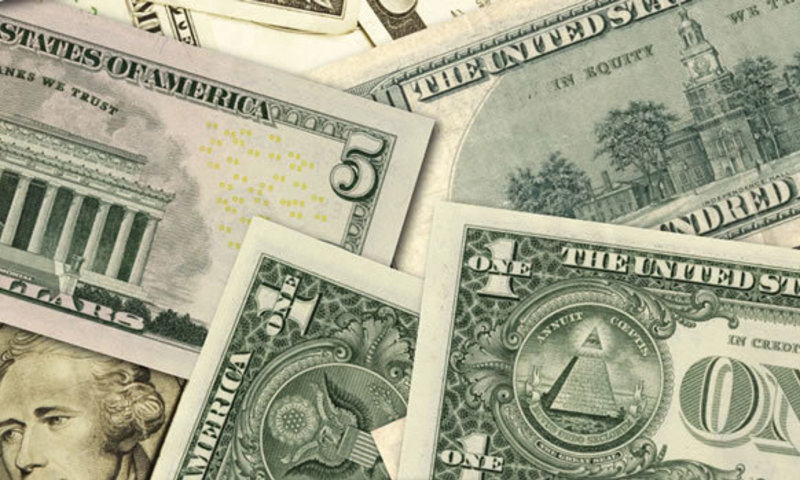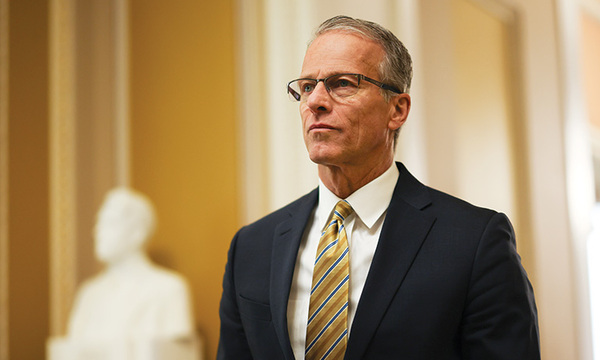On a Tuesday last fall, sophomore visual journalism major Maylin Rowe thought for sure she was not going to be able to continue at Biola. That Friday, $2,900 was due for the spring semester’s tuition. But because an expected federal loan did not go through and her family’s finances were tight, Rowe found herself without the money and with only three days to come up with it. She thought it was time to start packing. But just as her hopes were fading for another semester at Biola, something interesting happened. Rowe’s community recognized her need. Friends went door to door in the Alpha Chi dorm, collecting loose change on her behalf. Soon there were students in other dorms giving checks - sometimes for hundreds of dollars - to keep Rowe at Biola. By Friday, Rowe was lugging 30-pound boxes of change to the bank, hopeful that it would add up to the amount she needed. It was just enough.
“There was no possibility from a human standpoint,” she said. “It was miraculous.” Rowe was in disbelief, but knew God was sending her a message: Just trust me.
Maylin’s story reminds us that, in times of financial uncertainty and stress, important lessons can be learned. Wisdom can be gained. Faith can be strengthened. The assertion that “all things work together for good for those who love God” isn’t just a platitude to help us get through hard times; it’s a galvanizing announcement that God has a purpose for this recession and is working things out to that end. We just have to pay attention to see what we can learn about the “good” for which it is all working.
The following are five ideas of what that good might be - five lessons, reminders and biblical thoughts that represent an upside to this economic downturn.
1. God, not money, is our security
“We were so utterly burdened beyond our strength that we despaired of life itself. Indeed, we felt that we had received the sentence of death. But that was to make us rely not on ourselves but on God who raises the dead.” (2 Corinthians 1:8-9)
When things are easy and prosperous, we tend to rely on ourselves. But when crises happen and our 401(k)s evaporate, our self-reliance and “security” are thrown into doubt. In hard times, we realize that there is very little in life that we actually have control over. Perhaps this is the first lesson we should learn from this recession: Our God, not our resources, provides security.
The financial industry speaks of security often in terms of retirement accounts, social safety nets and the stock market. We even use the word “securities” to refer to a type of investment, something financial planner and Biola alumnus Peter Falk (’97) finds troubling.
“It’s tempting for Christians to view the stock market or investments as security,” said Falk. “But you have to remind yourself that while these things can be beneficial, you can’t take them with you.”
We should also remember that up until about 100 years ago, retirement accounts and government provided social safety nets were not commonplace. For most of history, people were dependent on God and family, notes Steve Rundle, an economics professor in Biola’s Crowell School of Business.
Rundle thinks we’ve gotten away from that now, and instead we turn to the government or ourselves for security. It’s a mentality found in churches too, said Rundle, where there are often financial seminars that emphasize how to manage a nest egg and learn to be financially self-sufficient.
“There’s an underlying emphasis in many of these seminars on becoming totally independent and not needing anybody - including God,” said Rundle. “And I think this crisis is showing us the folly of all that.”
Certainly, a crisis like this is a wakeup call to Christians who fall into the trap of self-sufficiency.
In a recent sermon about the financial crisis, pastor and author John Piper put it this way: “At the bottom of every Christian heart - no matter how advanced in faith and godliness - there is the sediment of self reliance. Then God shakes our lives, sometimes to the foundations, to show us our self-reliance and clean it out with a new, deeper reliance on him.”
2. We are stewards, not owners
“The earth is the LORD’s and the fullness thereof, the world and those who dwell therein.” (Psalm 24:1)
Another important lesson of a recession is the reminder that everything we have or think we “own” is not really ours at all. It’s God’s. When we look at our money in this way, we can’t help but be more conscious of how we use it.
Whether we’re talking about the environment or a paycheck, Christians must recognize that we must be wise stewards, said Mike Wilkins, distinguished professor of New Testament at Talbot School of Theology.
“If we view ourselves simply and solely as stewards of God’s grace, then we never hold on to anything too tightly,” said Wilkins. “I think it’s a wonderful opportunity for us to see ourselves as instruments of God.”
But what does stewardship actually mean for Christians in their everyday lives?
According to Falk, it means that we fundamentally approach money differently, as a tool that we are entrusted with to use for God. It means living within our means and viewing our money as God’s, and giving faithfully back to him.
This is an area where Christians could do better. Giving averages for evangelicals in the United States hover between 2 percent and 3 percent of gross income, even while most recognize 10 percent as the biblical ideal. And with the financial crisis bearing down on most wallets, some Christians are giving even less than normal.
But when money is tight, it doesn’t mean believers should stop giving. It means we should focus on our best investments and think about “what is going to be the most eternal bang for the buck,” said Falk.
This is good stewardship evaluating where our money goes and being sure to get the biggest “Kingdom R.O.I.” possible, said Rick Bee, senior director of alumni relations, who teaches a popular “Faith and Money” class every year at Biola.
As part of the class, which focuses on a biblical approach to finances, Bee gives each student $30 and instructs them to use it however they want - as long as it reflects the stewardship values they’ve learned in the class. Students also spend a class period playing Monopoly “as Christians,” where the goal is not to amass money or houses, but to acquire eternal rewards. The class, said Bee, “is meant to get students thinking with more of an eternal perspective.”
Having that eternal perspective - seeing that our role in the bigger picture of God’s plan is one of stewardship and not ownership - frees us from the bondage of money that enslaves so many. And it also invariably grows our faith.
3. Faith grows in tough times
“Therefore I tell you, do not be anxious about your life, what you will eat or what you will drink, nor about your body, what you will put on. Is not life more than food, and the body more than clothing? Look at the birds of the air: they neither sow nor reap nor gather into barns, and yet your heavenly Father feeds them.” (Matthew 6:25-26)
Most everyone was affected when the markets took their tumble last October, and Biola was not immune. Freshman Carissa Bixler was hit especially hard. She’s a missionary kid from Indonesia, and her parents are fully funded by the support of churches. As the recession worsened last fall, support began to wane. With two other brothers and a sister studying at other colleges, the financial burden for the family was immense. Bixler wasn’t sure she could come up with enough money for another semester at Biola.
Meanwhile, Biola responded to the financial crisis by commissioning a cross-departmental task force to address the immediate financial needs of students. Out of this came the Student Emergency Relief Fund (SERF), which raised nearly $150,000 to provide special scholarships to students who had been directly affected by the economic crisis and needed emergency funding in order to stay at Biola. Carissa was one of about 150 students who qualified and received scholarships. Her need was met because her community was generous. Biola alumni, staff, faculty, donors ... they all contributed to the fund.
It was a powerful dose of God’s providence.
“It’s not only how great God is and the great big things he can do, but also the great little things he can do,” said Bixler. “Money is a little thing, and God is still taking care of it.”
For Bixler - and indeed, for those who generously gave money to the fund that supported her - the experience was an exercise in trusting in God’s faithfulness. In times like this, when it’s hard to see how even God could make the math work, faith becomes all the more important.
“This is a season we can look back on as one of the great learning times of our faith,” said Biola’s president, Barry H. Corey. “We can walk forward with assurance that these are the times God shows up in faithful and even staggering ways.”
One of the ways Christians can build faith is to remain generous in giving, even if we don’t think we can afford to, said Rick Bee.
“Now’s the time for us to really step out in faith and support those organizations or individuals that are really having trouble,” said Bee. “It’s a great test for us. Do we trust that God will provide for our needs?”
While the rest of the world loses faith in their governments, banks and even themselves, what a testimony it would be if Christians grew in faith - if, while the rest of the world divested, Christians invested in God’s work. When everything in the world says we should worry more, what if Christians worried less?
It would be quite the message.
4. We must generously and lovingly meet the needs of others
“There was not a needy person among them, for as many as were owners of lands or houses sold them and brought the proceeds of what was sold and laid it at the apostles’ feet, and it was distributed to each as any had need.” (Acts 4:33-35)
What was going on with the early church of Acts 4? Was it some nascent form of Christian socialism? Some naive utopian vision of communal living?
No, says Mike Wilkins. It was the radical in-breaking of the kingdom of God.
“It was a realignment of values,” said Wilkins. Everything the early Christians thought they knew about individual self-interest was undermined in the call to seek first the kingdom of God. Because Jesus rose from the dead, everything changed. The early church responded to the resurrection by becoming givers rather than takers, stewards rather than owners, other-centered rather than self-centered. They became generous in new, radical ways, because of Christ’s generous act. And as a result, there was “not a needy person among them.”
But ever since the first century, the church has had a hard time living like the Christians of Acts 4.
“I think every generation has to relearn the kingdom mentality of the early church,” said Wilkins, who suggests that whenever we think about money as Christians, we should start not with our own needs but with those of others.
And when better to illustrate these kingdom values than in a recession, when so many in our families, churches and communities are in need of support?
But compassion goes beyond supporting our own communities; it also means that we reach out and help needy people wherever we find them. It means that we give away whatever we can, whenever we can, to ease the burden of others.
American Christians are a rich group. By some estimates, churchgoing American Christians collectively earn more than $2.5 trillion dollars every year. If they were a country, they’d be invited to G7 summits. But what are Christians doing with all this money? One thing they’re not doing - at least not to the extent they could - is giving.
If all American Christians gave 10 percent of their after-tax income back to the church, it would pump some $46 billion into Christian ministry on an annual basis, according to statistics on Christian giving in the book Passing the Plate. And if every Christian in the whole world did it, imagine the global humanitarian needs that could be met!
We have been greatly blessed. There are many who are in great need. It’s just a question of how much we are willing to give up.
5. We can learn to live with less
“No one can serve two masters; for either he will hate the one and love the other, or he will hold to one and despise the other. You cannot serve God and money.” (Matthew 6:24)
It’s part of the reason we got into this financial crisis, and it’s one of the things that must be addressed if we want to get out: our obsession with always wanting more.
On an individual and national level, Americans spend more money than they make, borrowing money they can’t repay and buying things they can’t afford. It’s something that can’t be sustained, says Rundle, who thinks the recession is a wakeup call for people to “get a grip on their finances and live more simply.”
The problem of over-the-top consumption is always going to be a problem in capitalism, because capitalism is imperfect and people are fallen, said Scott Rae, a business ethicist and Talbot professor of philosophy of religion and ethics. But that doesn’t mean that we should throw the baby out with the bathwater.
It’s not unethical to spend money, said Rae, “but we must remember that there’s more to life than accumulating stuff.”
Katrina Greene, an anthropology professor in Biola’s Cook School of Intercultural Studies, puts consumerism under the microscope every fall in her “Economy, Society & Values” class, which uses as a textbook Arthur Simon’s How Much is Enough: Hungering for God in an Affluent Culture.
In the class, students are encouraged to ask questions about what consumerism means in their lives. Do we identify ourselves through the things we buy, like clothing, cars and music? How much is enough? Is our thirst for “more” ever satisfied?
Greene, an economic anthropologist, emphasizes the contrast between American economic values like individualism with other cultures where there might be more of an emphasis on the welfare of the group.
“When you see other cultures, you can see how priorities are different,” she said. “We might learn from cultures where it’s not all about us and what we want, but where our identity is bound up in others, moving through life as a group, helping each other.”
---
At the end of the day, as we lament the bad economy and all that it means for our shrinking wallets, the truth is we have it pretty good. For billions around the world, our “recession” looks like an economic boom. The developing world is constantly living in a recession that is deeper and more desperate than America’s current situation.
And while we shouldn’t minimize the pain that many are going through in our own communities, hopefully these times will provide the affluent West with more empathy for the poor and marginalized in the rest of the world.
“Many people in the West are dealing with issues of unemployment and extreme financial hardship for the first time in their lives,” said Greene. “But many people in the rest of the world deal with issues of poverty and financial struggle every day.”
So perhaps above all, the recession offers us a bit of perspective: Money is important, but it isn’t everything. It isn’t ours, but it is ours to use for God.
It’s a wakeup call to get our priorities in order. It’s a reminder to seek first the kingdom of God, and his righteousness, and to move forward with confidence that God will bless our faithfulness.
 ∫⁄¡œ¿˙ ∑
∫⁄¡œ¿˙ ∑




